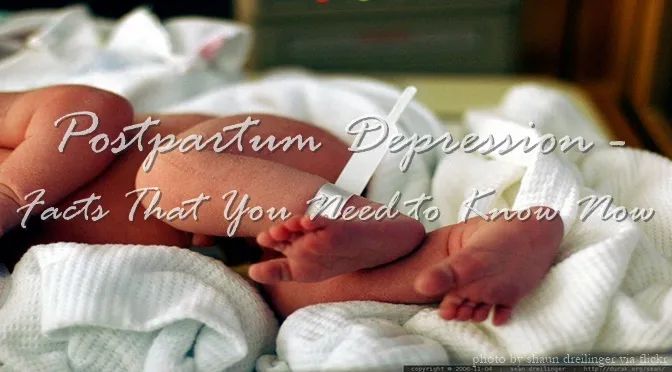
Postpartum Depression - Facts you need to know now
October 2016
this guest post is brought to you by Elizabeth, pre and postnatal exercise specialist and natural childbirth educator
The gray cloud that looms over many mothers is not talked about often enough. Postpartum depression effects up to 20% of mothers in the US and up to 40% of women in developing countries, and the consequences can be quite grave if untreated. If you or someone you love may be showing signs of postpartum depression, please seek help. You are not alone, nor are you at fault.
Pregnancy and birth is viewed as a time of extreme joy, love, and emotion, but the hormonal shifts taking place can overwhelm the body both mentally and physically. Motherhood is a challenge within itself and it can be easy to overlook warning signs that something is wrong. There are also many misconceptions when it comes to postpartum depression.
Transitioning into parenthood or adding a sibling to the family tends to come with a list of things mothers want to accomplish, from breastfeeding to newborn pictures, researching first foods and possible shot schedules. No mother asks to have postpartum depression, nor would she wish it upon anyone else. This disorder can interfere with everything a mother had planned for her time with her newborn. It can suck weeks, months, or longer from everyone in the family, leaving a void instead. It is important to recognize symptoms and ask for help as early as possible. Every mother deserves the chance to experience the happiness of motherhood with their newborn.
Postpartum Depression Facts
PPD is a mood disorder. Estrogen and progesterone hormones drop quickly after birth, leading to chemical changes in the brain. These changes trigger mood swings, which can be common for new mothers, but when the gray cloud doesn’t seem to rise, postpartum depression can be the cause. Symptoms can worsen when a mother is tired or stressed. A mother suffering from postpartum depression may seem sad, angry, emotional, or anxious
PPD is not “Baby Blues.” Up to 80% of new mothers experience mood swings and sadness that comes and goes as her hormones rebalance after birth. This is known as baby blues and generally does not need anything but rest and time to overcome. Postpartum depression does not come and go, but instead hangs on to a woman and takes over her daily life.
PPD does not always occur immediately after birth. Research shows that most mothers report postpartum depression within the first three months after giving birth. This time is also known as the fourth trimester and is when the body and baby are both transitioning into their new roles. Postpartum depression can occur after this point as well – up to a year after having a baby. Hormones are constantly shifting, especially while breastfeeding or as the menstrual cycle returns. Depression may also strike while pregnant. Again, there is no rule to the timing of it all.
PPD treatment is available for everyone, even breastfeeding mothers. So many mothers assume that breastfeeding means they cannot take medications, but that is untrue. Work with a lactation consultant if medication is needed to learn the safest antidepressant medications to help treat postpartum depression.
PPD does not mean you will harm your baby. The most extreme level of postpartum depression is postpartum psychosis. It effects 1-2 women out of every 1,000 diagnosed with postpartum depression. It is only in these rare cases that a mother truly hits a point of possibly harming herself or her child. At this level, a woman is going without sleep, imagining and possibly acting on violent thoughts. More commonly though, postpartum depression makes a woman feel distant from herself, and causes feelings of failure, sadness, and isolation.
PPD does not always happen with the next baby. Having postpartum depression following a birth does increase the odds of experiencing it again after another baby, but it is not a guarantee. Consider encapsulating the placenta with the next birth and talk to a counselor throughout the pregnancy for preventative measures.
PPD is NOT your fault, and you are NOT alone. Media makes motherhood look like the impossible. Our society tends to continue the trend of perfection by highlighting every glamorous aspect of parenthood in parent groups, playdates, and on social media. This only worsens the symptoms of a mother suffering from postpartum depression. All of the ‘false parental advertising’ aids in the self-shaming and isolation of PPD. It is important to understand that so many women are secretly suffering and ashamed to talk about it. Postpartum depression can happen to any mother, and it is time to start talking.
PPD symptoms include:
- Irritability
- Anger
- Restlessness
- Sadness
- Urge to cry, or crying often
- Worthlessness
- Guilt
- Anxiety
- Worry of hurting baby
- No concern/lack of maternal connection
- Decreased energy
- Headaches
- Chest pains
- Rapid heartbeat
- Sleep trouble
- Over-sleeping
- Unhealthy food cravings
- Trouble concentrating
- Indecisiveness
- Hopelessness
- Withdrawing from family or friends
About the author…Elizabeth is a passionate writer at My baby’s Heartbeat Bear, a pregnancy & babyshowers gifts store, focused on educating those open to learning. She is also a pre and postnatal exercise specialist, natural childbirth educator, former teacher and current homeschooler to her 4 young children. Check out Elizabeth's week by week pregnancy tips and parenting insights at her Pregnancy Blog.
